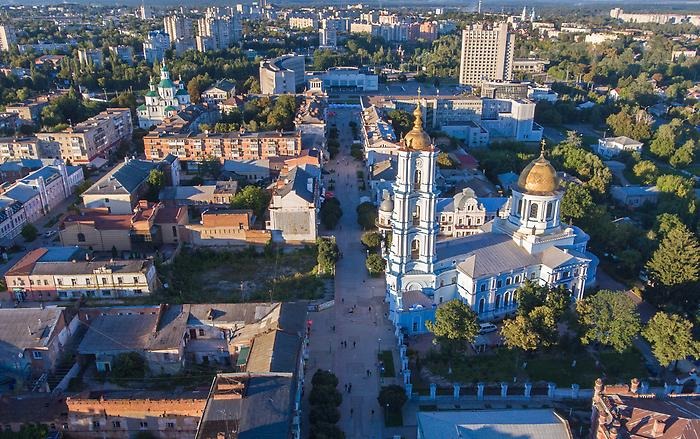JIBS continues to support Ukraine's democratization in new collaborative project
In a new collaborative project, researchers from Jönköping International Business School (JIBS), together with several other actors, will help implement the “Good Governance Principles” among officials in the Sumy region of Ukraine.
%20Skyline_of_Sumy_(cropped).jpg)
Photo: Maksim Bondarevskij - Own work, CC BY-SA 4.0, https://commons.wikimedia.org/w/index.php?curid=115923622
The new project is funded by the Swedish Institute (SI) and is a collaboration between Jönköping Municipality, JIBS, Moldova State University, Sumy State University and a non-governmental organization. and will focusdfopå on public administration and governance in Ukraine. The name of the project is “Good Governance and Accountability in Public Administration (GAAP).
Working on projects in Ukraine is nothing new for JIBS researchers. During the past year and a half, another project has been underway to help democratize and modernize the public sector in the Ukrainian municipality of Konotop.
“We are taking the lessons learned from the first project “Municipal democratization in Ukraine into this new project and developing them further,” says Timur Uman, Professor of Business Administration at JIBS and one of the project leaders of the new project.
It is Timur Uman who, together with Olof Brunninge, Associate Professor at JIBS and Yuliya Khvatsik, Assistant Professor from JIBS, will drive the new project forward.
“This project differs from the one in the municipality of Konotop because it is about regions and is not only aimed at individual municipalities. It is also the case that the Konotop project worked with both civil servants and politicians, while the new project only targets civil servants.
Part of the SI Ukraine Cooperation Program
The project aims to help democratize Ukraine by implementing the “Good Governance Principles” in public administration and targets officials in the Sumy region of Ukraine. The project is part of the SI Ukraine Cooperation Programme, which was launched by the Swedish Institute (SI) in the spring of 2024. The projects that are granted support are expected to contribute to strengthening the capacity of organizations, as well as increased skills, broadened contact networks and new knowledge for individuals. The programme is part of a new major Ukraine initiative at SI.
The programme is divided into three different modules, of which the first module will run in Moldova already in June 2025, the second module in Sweden in 2026 and the third module in Moldova in May 2026.
Competition for 56 million SEK
As many as 168 different actors from Sweden had submitted applications to SI, of which 41 were granted funding.
"It is an important project for JU and we are very happy that we are one of the 41 organisations in Sweden that have been granted funding, says Måns Svensson," President of JU.
In total, SI distributes 56 million SEK to projects that will support Ukraine's construction, reform work and EU integration in areas such as inclusive economic development, entrepreneurship and trade, as well as human rights, democracy, the rule of law and gender equality.
“We are very pleased to have been awarded this project. Especially considering the strong competition,” says Timur Uman.
Timur says that one of the many challenges in Ukrainian municipalities is that differences between politicians and officials have become very blurred during the war.
“Therefore, Ukraine needs help to sort out who should do what at the municipal level. It is very much about communication between politicians and officials and who should bear the responsibility. These are important democratic issues.”
Sometimes, there is strong political control, which makes it more difficult to implement certain things at the official level.
Inspiration from the Swedish model
The Swedish model is a good example of how it should work from different aspects, where solidarity is one aspect, and transparency, equality and gender equality are other factors that are important within the “Good Governance Principles” model.
In this context, the Swedish model means clear responsibilities, that the various stakeholders are kept informed and that officials feel accountable to their most important stakeholders, the citizens.
“Currently, there are many women who take a lot of responsibility at the official level in Ukraine and therefore it is also important to highlight the gender perspective within the project,” says Timur.
The program will develop free modules that partners in Ukraine and Moldova will be able to use as their own training packages.
“We are taking examples from the Swedish model to inspire and encourage the implementation into Ukraine of similar mechanisms that we know work in Sweden,” says Timur.
